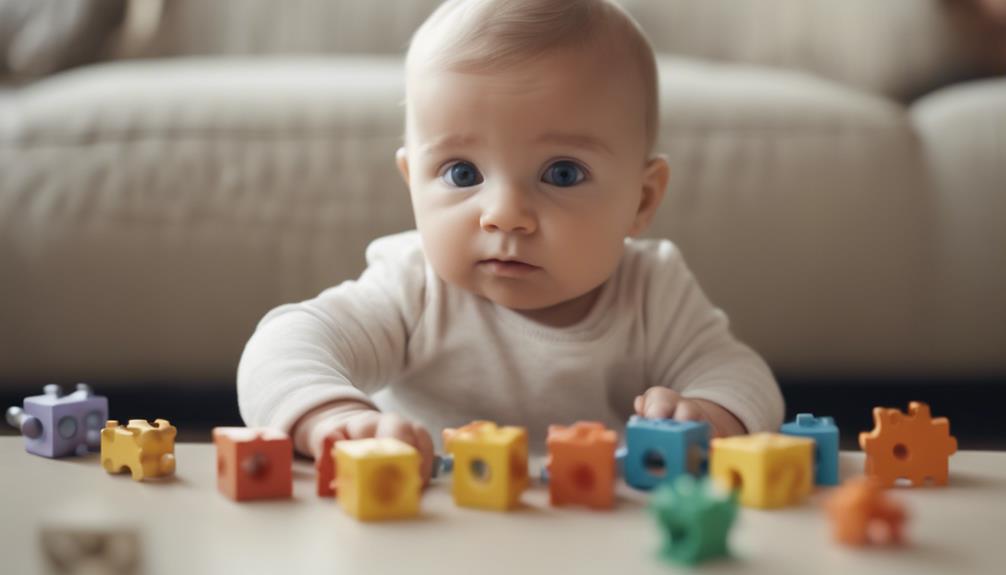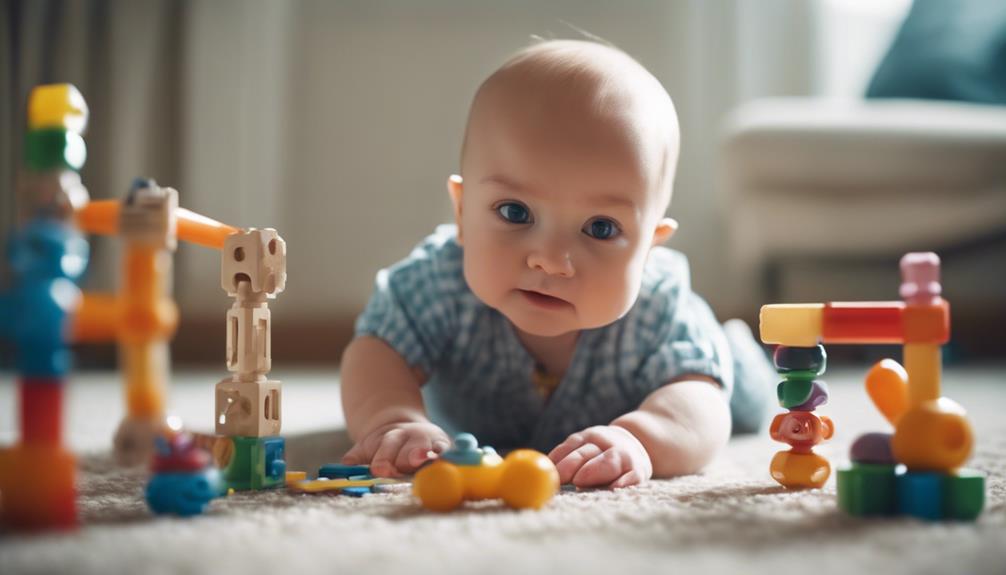To determine if your baby is smart, watch for signs like advanced problem-solving skills, exceptional focus, and high curiosity. Look for them engaging in solo play, asking complex questions, and showing early communication skills such as following verbal directions and forming sentences before 14 months. Notice if they display exceptional memory, quick learning abilities, and interest in complex puzzles. Pay attention to their unique strengths, talents, and intellectual curiosity. Keep an eye on developmental milestones like sitting up at 3 months and speaking sentences at 10 months. These key signs can give you valuable insights into your baby’s intelligence and development.
Key Takeaways
- Displaying advanced problem-solving skills and exceptional focus.
- Showing high curiosity and preference for intellectual stimulation.
- Early mastery of challenges and recognizing developmental milestones.
- Strong communication skills, including early sentence formation.
- Demonstrating unique strengths, interests, and rapid cognitive abilities.
Early Communication Skills
If your baby displays early communication skills, such as vocalizing, showing interest in words, and following verbal directions, it may be a sign of advanced intelligence. Observing these traits in your little one could indicate a propensity towards strong communication skills.
Babies who start forming sentences before 14 months and can comprehend simple instructions early on show potential in this area. According to child development experts, advanced verbal skills, clear pronunciation, and the ability to construct sentences at a young age can be early indicators of high intelligence.
To nurture these abilities, it's crucial to encourage early communication by engaging in activities like reading, talking, and praising your baby's achievements. By paying attention to how quickly your baby picks up words, expresses their needs, and engages in conversations, you can gain insight into their developing intelligence.
Advanced Cognitive Abilities

Demonstrating rapid language acquisition, advanced problem-solving skills, and high levels of curiosity are key indicators of gifted babies' advanced cognitive abilities.
When assessing your baby's cognitive development to identify signs of intelligence and high-level potentialities, consider the following:
- Exceptional Memory Capacity: Gifted babies often showcase remarkable memory retention, allowing them to recall information with ease and speed.
- Early Pattern Recognition Abilities: These infants demonstrate a keen eye for identifying patterns in various stimuli, showcasing their cognitive prowess from a young age.
- Interest in Complex Puzzles: Gifted babies exhibit a strong attraction to challenging puzzles and problem-solving activities, showcasing their high-level thinking abilities.
- Quick Learning Ability for New Concepts: These infants display a rapid grasp of new concepts and ideas, showcasing their potential for advanced cognitive growth.
Unique Strengths and Interests
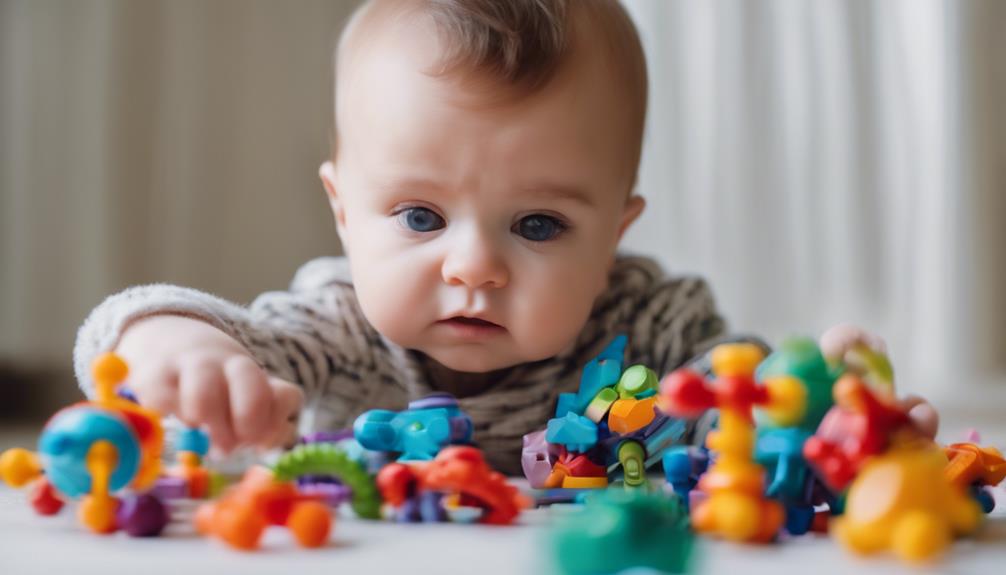
Smart babies often showcase special talents and passions that set them apart from their peers. They may exhibit an unusual intellectual curiosity that drives them to explore complex puzzles and challenges.
These unique strengths and interests can be early indicators of their advanced cognitive abilities and potential for exceptional learning capabilities.
Special Talents and Passions
One key indicator of high intelligence in babies is their early display of special talents and passions, including a keen interest in music, art, or problem-solving activities.
When it comes to identifying if your baby is showing signs of being smart, paying attention to their unique strengths and interests is important.
Here are four key points to keep in mind:
- Early Display of Exceptional Skills: Gifted babies may showcase their special talents and passions from a young age, excelling in areas like music, art, or problem-solving activities.
- Interest in Specific Subjects: A baby's unique strengths might be evident through a strong fascination with particular subjects like mathematics, language, or creative expression.
- Natural Aptitude: Look out for a baby's natural aptitude for certain activities as it can indicate high intelligence and a potential area of talent.
- Nurturing Talents: Identifying and nurturing a baby's special talents and passions can play an important role in developing their intelligence and honing their natural gifts.
Unusual Intellectual Curiosity
Exhibiting exceptional intellectual curiosity, gifted babies often display a remarkable enthusiasm for exploring new information and delving into complex subjects. Their intelligence shines through as they eagerly seek out knowledge, showing a deep interest in specific topics and a hunger for understanding intricate concepts. Gifted infants stand out by their relentless pursuit of learning, asking insightful questions that showcase their thirst for knowledge. Parents may observe their baby's unique strengths and interests leading them to engage in intellectually stimulating activities and seek advanced learning opportunities.
| Signs of Unusual Intellectual Curiosity |
|---|
| Constantly seeking new information |
| Delving deep into understanding complex concepts |
| Asking insightful questions and showing a thirst for knowledge |
Responsive to Stimulation
Showing heightened responsiveness to stimulation is a key indicator of intelligence in babies. When observing your little one, keep an eye out for these signs:
- Increased Alertness:
Smart babies tend to be more alert and attentive to their surroundings. They may quickly react to new sounds, sights, or activities, showing a keen interest in the world around them.
- Curiosity and Engagement:
Intelligent babies often display a strong sense of curiosity, exploring their environment with enthusiasm. They may actively seek out new experiences and stimuli, demonstrating a thirst for knowledge.
- Interest in Problem-Solving:
Smart babies may exhibit advanced problem-solving skills when faced with challenges or puzzles. They show a determination to overcome obstacles and find solutions to problems.
- Response to Varied Stimuli:
Encouraging your baby with diverse stimuli can help nurture their intelligence and responsiveness. Providing different experiences and opportunities for learning can further enhance their cognitive development.
Developmental Milestones
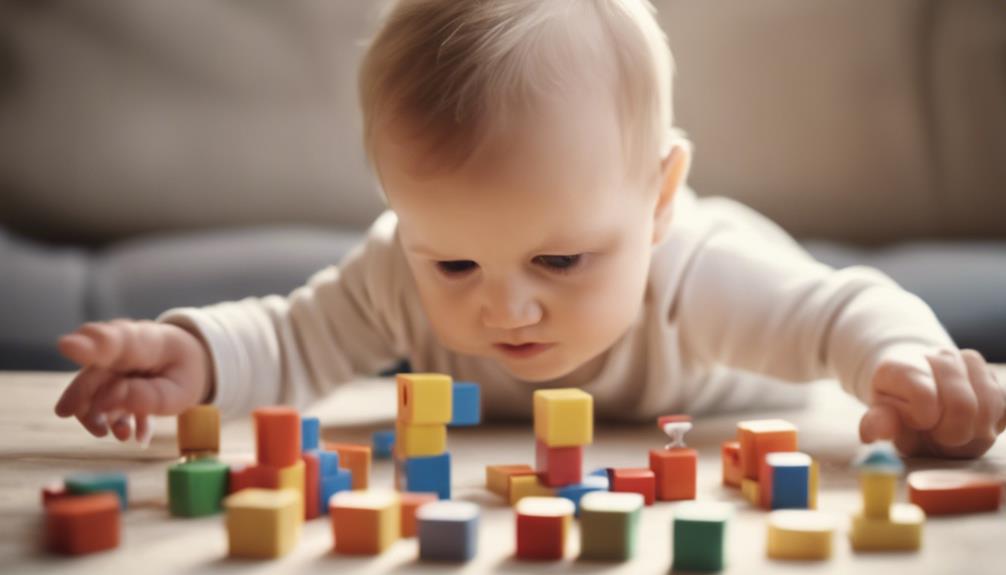
To understand your baby's intelligence, it is important to recognize their developmental milestones and how they align with cognitive growth. Reaching milestones earlier than peers, such as sitting up alone at 3 months or speaking clear sentences at 10 months, can indicate high intelligence in babies. Early signs of highly intelligent babies include early vocalization, interest in words and books, following verbal directions, forming sentences before 14 months, and understanding instructions.
Here is a table summarizing key developmental indicators of intelligence:
| Milestone Achievement | Signs of Intelligence |
|---|---|
| Sitting up at 3 months | High alertness and quick recognition |
| Speaking sentences at 10 months | Interest in words and books |
| Following verbal directions | Bonding with family members |
| Forming sentences before 14 months | Early problem-solving skills |
| Understanding instructions | Early analytical skills |
Gifted babies may show accelerated milestone achievement, quick grasping, early gesturing, and advanced problem-solving skills. These early indicators can help you identify the potential intelligence of your baby.
Nurturing Environment
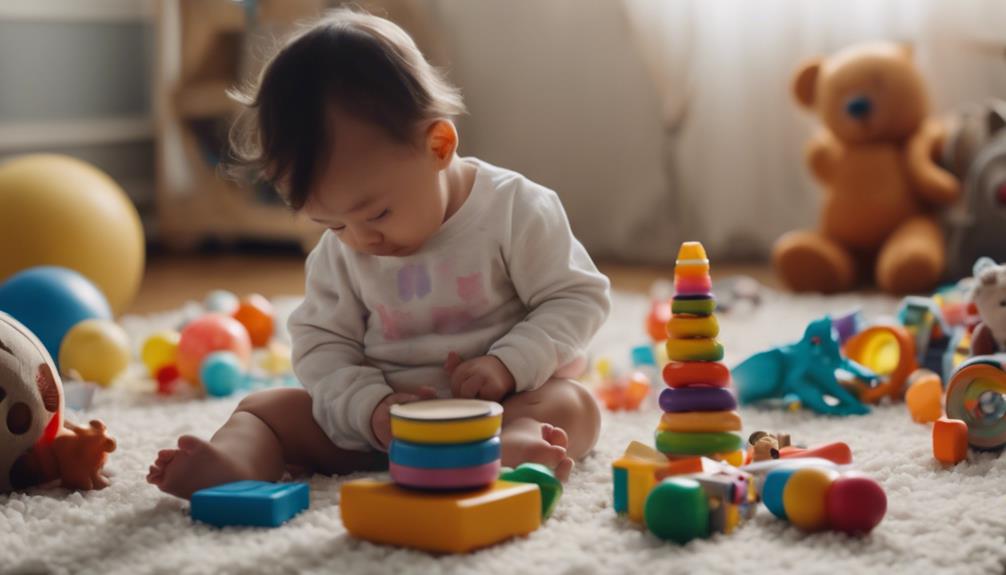
Creating a nurturing environment for your baby is essential for fostering their intelligence and cognitive development. Here are four key ways to provide the love and support your baby needs for best growth:
- Engage in Stimulating Activities: Reading, talking, and playing music with your baby can greatly enhance their cognitive development.
- Respond Promptly to Needs: Creating a secure environment and promptly attending to your baby's needs are vital for their intellectual growth.
- Recognize Natural Gifts: Identify and support your baby's natural gifts through appropriate stimulation to aid in their overall development.
- Understand Unique Strengths: Take the time to understand your baby's unique strengths and interests to help cultivate their intelligence in a nurturing environment.
Overall Growth and Development
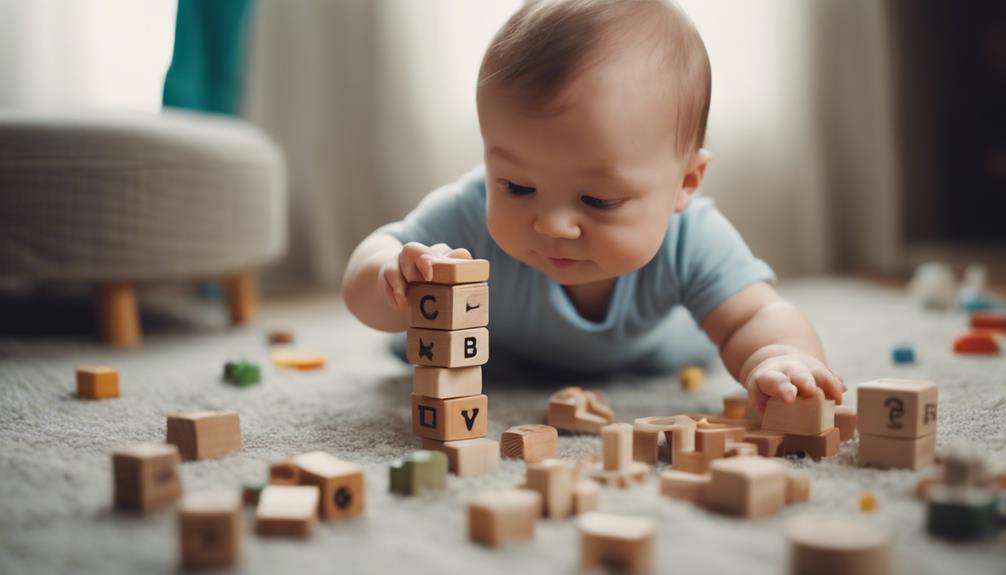
Promote your baby's overall growth and development by actively observing their early developmental milestones and unique behaviors. Look for signs like sitting up alone at 3 months or forming sentences before 14 months.
A child displaying advanced problem-solving skills, mastering challenges earlier than peers or finding creative solutions, may indicate high intelligence. Keep an eye out for exceptional focus, such as playing with blocks without distraction or listening attentively to a whole book.
If your child prefers solitude over social interaction, enjoying solo play or engaging in intellectual stimulation with older children, it could be a sign of advanced cognitive abilities.
Additionally, signs of high curiosity, like asking complex questions or exploring surroundings with great interest, could indicate a smart child. According to Child Development Specialist Dr. Johnson, 'Observing and recognizing these developmental milestones and behaviors is essential in understanding a child's intellectual capabilities.'
Frequently Asked Questions
How Do I Know if My Baby Is Gifted or Just Smart?
To know if your baby is gifted or just smart, observe their language skills, problem-solving abilities, curiosity, memory, emotional awareness, empathy, and motor skills. Recognizing and nurturing their talents early on is essential for their holistic development.
How to Check Baby IQ Level?
To check your baby's IQ, focus on fostering growth through play, exploration, and interaction. Observe their responses, milestones, and engagements. Consult experts for guidance. Remember, supporting overall development is key. Trust the process.
What Determines How Smart a Baby Is?
Your baby's intelligence is influenced by factors like genetics, environment, and early experiences. High birth weight, early milestones, problem-solving skills, curiosity, focus, memory, and language development can all play a role in determining their intelligence.
How Do I Know if My 20 Month Old Is Advanced?
To know if your 20-month-old is advanced, observe their problem-solving skills, communication abilities, and independent behavior. Watch for signs of heightened curiosity, long attention span, and memory retention. Trust your instincts; they often reveal the truth.
Conclusion
To sum up, remember that intelligence is a complex and multifaceted trait that can't be fully determined by early signs alone.
While certain behaviors may indicate potential, it's important to foster a supportive and enriching environment for your child's overall growth and development.
As psychologist Angela Lee Duckworth aptly stated, 'Grit is passion and perseverance for long-term goals. One way to foster this is by encouraging a growth mindset in children, emphasizing effort over innate ability.'

